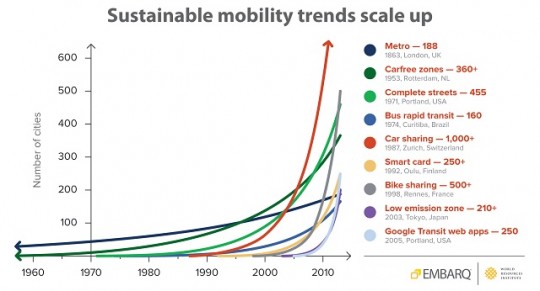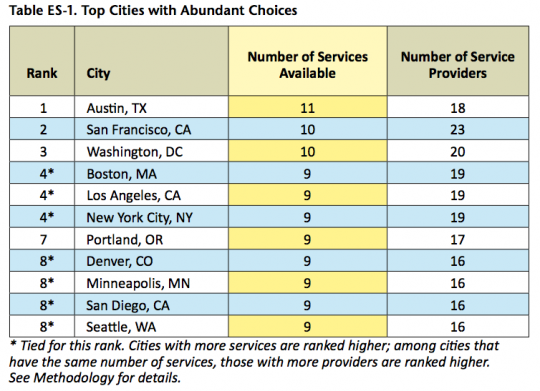When the news went around last year that Helsinki was planning to “make car ownership pointless within 10 years,” it was misread in some quarters as a plan to remove cars completely from the Finnish capital.
But Helsinki’s actual plan was to use a combination, or “web,” of smartphone apps, carsharing, bikesharing, ridesourcing, taxis and mass transit — and, of course, walking and biking — to remove the need for people to own a car.
The mistake was telling, because the whole point of these new, rapidly growing tools is to stop “using a car” from meaning the same thing as “owning a car.” Once we can break the link between car ownership and car use, the theory goes, many more people will opt out of the all-you-can-drive buffet of car ownership and instead use cars only for the sort of trips that cars are actually good at.
Advertisement

Enter U.S. PIRG’s new report on the “Innovative Transportation Index,” which ranks 70 U.S. cities based on the number of different services available in each of 11 categories:
- Fixed-location carsharing like Zipcar
- Floating-fleet carsharing like Car2go
- Peer-to-peer carsharing like Getaround and Relay Rides
- Ridesharing (aka carpooling) like Zimride and Carma
- Ridesourcing like Uber, Lyft and Sidecar
- Taxi hailing like Curb and Flywheel
- Bike sharing
- Static transit data that helps you plan trips by bus and train
- Real-time transit information that helps you monitor actual bus and train arrival times
- Multi-modal apps like RideScout and CityMapper
- Virtual ticketing like GlobeSherpa’s TriMet tickets mobile app
Portland was marked as offering at least one service in every category except ridesharing and bike sharing but made up for its most unusual gap (bike sharing) by offering a relatively unusual service (virtual ticketing). The PIRG ranking broke ties based on the amount of competition within each category, which is what pushed Portland one step above Denver, Minneapolis, San Diego and Seattle, but one step below Boston, Los Angeles, and New York.
It was in April 2007 that Alan Durning of Seattle’s Sightline Institute named “car-head,” the misconception that “automobile” is basically a synonym for “transportation,” as the mental condition that causes many of our cities’ problems.
That was two months before the Apple iPhone went on sale. The eight years that have followed have brought us within reach of eradicating car-head, at least in big cities. We’ll be eager to see what happens next.


